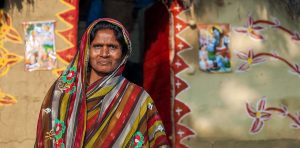People of Bharat: Bhanuben, Ahmedabad

Bhanuben 46, is a native of Morbi in Saurashtra, but was born, raised and married in Ahmedabad. She lives in an urban settlement in Ahmedabad. I ask her if she is married. She bursts out giggling in response. Of course she is married! I tick it off in the form. Bhanuben tells me she was studying in class 9 when her parents received a marriage proposal for her and she was married soon after. Bhanuben had received skills training in carpentry and stitching in school; she stitches pillow covers for a living. She also took up a course in ‘beauty parlour work’ later on but didn’t find it worthwhile as a career option. Her husband works as a supervisor peon in a well- known local daily; she has two sons of 26 and 24, one of whom got married last year.
Bhanuben tells me she is a community volunteer with a locally-based NGO. She joined a Community Action Group (a group formed of local community representatives) in her resident slum 13 years back. At that time, she was part of a group that spread awareness about government schemes/benefits within the community. Owing to her dedication, she was subsequently selected as an area-level Community Based Organiser (CBO). As a CBO, Bhanuben is involved in leading group representations for community problems especially sanitation, to the local governing body. She contributes towards the community organising work for about 8–10 days a month and receives a nominal stipend from the NGO she is associated with. Sometimes, she teams up with other CBOs to conduct surveys for the NGO, outside of the city.
Bhanuben’s tailoring work brings in Rs. 4–5000 every month. The work is seasonal and its demand is high during certain festivals such as Navratri and wedding season. Both her sons have completed their graduation. While one works with Axis Bank, the other works with Airtel. Among the 4 of them, they collectively earn about Rs. 45,000 per month. They own three motorbikes, a television, refrigerator and a computer. One of her sons owns a smart-phone. In September 2017, Bhanuben took a loan of Rs. 3.5 lakhs for a new house from a credit cooperative society. As a household they spend Rs. 15,000 towards groceries, bills and petrol costs. They make a monthly payment of Rs. 8,000 towards loan payment for the house. Bhanuben saves Rs. 500 with the same credit cooperative every month; she also pays Rs. 330 towards monthly insurance premiums and Rs. 200 towards a government pension scheme. Bhanuben and her family had approached a commercial bank for house loan in 2017, but they were not able to furnish the documents required. She remembers that the bank executives did not show interest in giving her a loan. “They made me wait (on the side) every time I was there. That’s when I decided against it and approached this (credit cooperative bank).” Last year her elder son got married. She was able to finance most of the wedding from her savings and borrowed some money from her siblings. She does not have to pay her brother back as traditionally her brother is supposed to help her out with wedding expenses.
Bhanuben recollects having a lifetime of struggle. She followed her husband to Surat after her wedding. They lived in a one room house at the slum with her husband’s parents and brother’s family. “We were eight of us in one room. Because we were newly married we got the bed to sleep– it was parted with an old mosquito net. The rest of them slept on the floor. Before being married I hadn’t done any household chores. Never had I carried water from the pump to the house, never gone to get the wheat milled, or cooked on an earthern stove. When unmarried, I even wore heels and we had enough. But everything changed after I got married.” The house had an open gutter flowing right outside the entrance with the hassle of heat and humidity compounded by mosquitoes. When her parents came to visit her for the first time, they were shocked to see her face and arms covered in mosquito bites. While leaving, her father gave her Rs. 600 to buy a fan for the house. Three years into the marriage, she borrowed some money for a new roof sheet for the house. Couple of months later her father-in-law threw her out of the house over a family quarrel. “We gave that house to my father-in-law and moved to another place. The money I had put in was of no use to me.” They moved to another locality in Surat but it kept getting flooded every year and her sons kept falling ill. So she and her husband decided to move to Ahmedabad. They have been here ever since. Bhanuben found work as a domestic worker but her family strongly opposed it. “I had to hide from them and go for work. They were worried about what people would say but I had a family to run. My father-in-law did not like me doing that work. But would he give me the money to run my house? No! Even if he did, he would have made me feel petty about it, for the rest of his life!” She eventually quit domestic jobs and restarted her stitching work. Bhanuben couldn’t save much when her sons were studying; she managed to save Rs. 100 a month with a credit cooperative bank. When her sons joined college, they took up part-time jobs which helped her save much more. Now she feels like life is kinder. “From 1988 till now my life was a sangharsh (struggle). Now atlast I have some sukh (happiness/satisfaction).”
Before she joined the NGO as a volunteer, Bhanuben was a very different woman. “Bahar nikalwa ni himmat nohti; bolva ni himmat noht. Bas ghar ane machine” (I didn’t have the courage to step out of the house, no courage to speak up; (my world) was my home and the (sewing machine). She narrates how her husband would get the cloth; she would stitch it and the women who worked for the merchants would come home to collect the finished pillow-covers. In case she had to go to the market; she would get anxious even while hailing a rickshaw! Now Bhanuben radiates self-confidence. “I learnt to speak in public; go wherever I wanted to and do whatever I wanted to. Now I am aware of news of what happens all over the world.” She wants to pass on what she has learnt at the NGO. “Mara ma jaagrui avi toh lokoma pan felavi” (when I got awakened, I made others aware too). Initially Bhanuben faced a lot of resistance in her community work. People did not support her efforts and it was difficult to convince other women. She had to repeatedly explain them the benefits of a having a closed drainage system in place. Slowly she built a team of a few women and they kept going multiple times to the officials to represent their problems. At times the officials also treated her as a hassle, threatening to have the dogs chase her. Her perseverance bore fruit and the work on the drainage system started for the first time in her locality. “When it was completed, people understood what I had done. They started having faith in me. It became easier then,” she confesses smiling.
Her husband and sons supported her; her extended family not so much at first. “Thelo layni rakhadva nikli (Takes a bag and goes off to roam!) People have accused me with such words,” Bhanuben, recalls the hurt with narrowing eyes. Bhanuben is a woman very much in control of her financial decisions. She buys gold for herself or her family whenever she wants to with her own money and operates a bank account in her name. She struggles with a smartphone; but Bhanuben has learnt to persist. “Once I had to enter details into a smartphone as part of some survey work. Other women encouraged me to learn — I sat down with my son and he taught me. I was determined to learn it. I made some mistakes for the first couple of forms, but then I got better and completed 15 forms in a single day which was more than anyone else over there!” Her face beams with pride and fulfilment at her achievements. Her sons are getting independent; but she doesn’t want to retire from work (to enjoy life). “Life is easier but I want to rise in my (volunteer) work. I have reached the Mayor’s office now”, she says cheekily. ‘I want to reach the Prime Minister’s, someday!’
This research was developed as part of the Bharat Inclusion Initiative.
